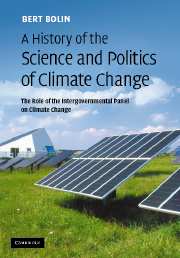 A History of the Science and Politics of Climate Change
A History of the Science and Politics of Climate Change Book contents
- Frontmatter
- Contents
- Foreword by Bo Kjellén
- Abbreviations
- Part I The early history of the climate change issue
- Part II The climate change issue becomes one of global concern
- 5 Setting the stage
- 6 The scientific basis for a climate convention
- 7 Serving the Intergovernmental Negotiating Committee
- 8 The IPCC second assessment report
- 9 In the aftermath of the IPCC second assessment
- 10 The Kyoto Protocol is agreed and a third assessment begun
- 11 A decade of hesitance and slow progress
- Part III Are we at a turning point in addressing climate change?
- Some concluding remarks
- Notes
- References
- Name index
- Subject index
6 - The scientific basis for a climate convention
Published online by Cambridge University Press: 03 May 2010
- Frontmatter
- Contents
- Foreword by Bo Kjellén
- Abbreviations
- Part I The early history of the climate change issue
- Part II The climate change issue becomes one of global concern
- 5 Setting the stage
- 6 The scientific basis for a climate convention
- 7 Serving the Intergovernmental Negotiating Committee
- 8 The IPCC second assessment report
- 9 In the aftermath of the IPCC second assessment
- 10 The Kyoto Protocol is agreed and a third assessment begun
- 11 A decade of hesitance and slow progress
- Part III Are we at a turning point in addressing climate change?
- Some concluding remarks
- Notes
- References
- Name index
- Subject index
Summary
IPCC works towards presenting a comprehensive analysis of a possible human-induced climate change; politicians try to understand and position themselves in preparation for likely future negotiations of a climate change convention.
Work begins
The IPCC had been formed and its task for the next 18 months had been agreed. Time was short for the completion of a full assessment. The work had to be done in a new setting and involve many people who had not previously been engaged in such activities. Measures had to be taken to structure the work and to ensure broad participation by key scientists. The three working groups scheduled meetings for the early months of 1989. Outlines of their reports were agreed, lead authors for the individual chapters selected and workshops on key topics scheduled.
The fact that the issue of climate change had been brought to the attention of the UN General Assembly implicitly meant recognition of the importance of the climate change issue and also of the IPCC itself. This became obvious at the first meeting of Working Group III in Washington in January 1989 (see IPCC (1989a)). The newly appointed US Secretary of State, James Baker, gave his very first public speech in his new position at the opening of this meeting. The majority of those attending were not scientists. There were five members of US Congress and some 25 delegates from government ministries and agencies. This was not the composition of the audience that I had imagined. It is interesting to recall a few key issues that were brought forward on this occasion.
Secretary Baker applauded the recognition of environmental problems as a transnational issue.
- Type
- Chapter
- Information
- A History of the Science and Politics of Climate ChangeThe Role of the Intergovernmental Panel on Climate Change, pp. 53 - 78Publisher: Cambridge University PressPrint publication year: 2007
